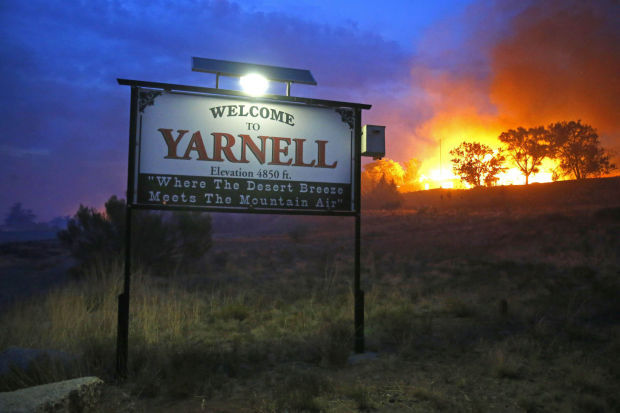PHOENIX — The mother of one of the firefighters killed in the Yarnell Hill blaze has no right to sue the state for her son’s death, the Arizona Court of Appeals ruled last week.
In a unanimous opinion, the judges said Marcia McKee presented no evidence the actions of the state that day in 2013 amounted to “willful misconduct” by anyone involved.
Appellate Judge Andrew Gould acknowledged McKee’s allegations show “a series of negligent and grossly negligent acts” that, if proven, culminated in the death of her son, Grant, and 18 other members of the Granite Mountain Hotshot crew. But he said McKee provided no evidence these acts “were done knowingly and purposely with the direct object of injuring the firefighters.”
That distinction is critical .
Gould said McKee and his fellow firefighters, who were employees of the city of Prescott, were effectively working that day as employees for the state. And workers killed on the job are not entitled to sue but instead get only those benefits provided under the state’s workers’ compensation system, meaning a set percentage of what the person was earning.
Arizona law, however, does permit lawsuits against employers in cases of “willful misconduct.”
Attorney David Abney said he has evidence that a ground supervisor and an air tactical supervisor, both state employees, went home in the middle of the blaze, leaving their duties to less-experienced underlings. And that, he said, amounts to dereliction of duty.
But Gould said none of that matters unless Abney can show the supervisors acted “with the deliberate intention of harming McKee or any member of the Granite Mountain Hotshot crew.” Abney told Capitol Media Services he will seek a Supreme Court review.
The firefighters were killed when the wind changed direction and they became trapped in an unburned area.
McKee’s lawsuit was one of several filed against the state.
Last year, a dozen of the families agreed to settle for payments of $50,000 each; seven other families that did not sue got $10,000 apiece in a settlement approved between the state Forestry Division and the Industrial Commission of Arizona, which regulates worker safety. But the commission left in place its findings that there had been violations of worker-safety rules.
One was that, at the time of the blaze, the state agency had vacancies in the positions of both safety officer and planning section chief.
Marshall Krotenberg, the lead investigator for the commission’s Division of Occupational Safety and Health, said that meant no one was available to pay attention primarily to the safety of the firefighters versus simply battling the blaze.
Commission members also said there was a failure to properly plan how to battle the blaze, especially after initial efforts failed.
But the most egregious violation, Krotenberg said, essentially came down to the Forestry Division having the wrong priorities.
“Folks were put in positions, overly hazardous positions, to protect property that was unprotectable under the current conditions of the extreme fuel, dryness, the drought and wind conditions,” he told the commission. “The employer implemented (fire) suppression strategies that prioritized protection of nondefensible structures and pastureland over firefighter safety.”
In presenting his findings to the commission, Krotenberg said that was a “willful” violation of worker-safety laws. But he stressed that, under state labor laws, that did not mean anyone at the Forestry Division intended to harm the firefighters or acted with malicious intent.
It is that distinction the Court of Appeals concluded bars McKee from being able to sue.
Abney said the normal cases of willful misconduct occur in situations where an employer who does not like a worker consciously gives that person poor safety equipment with the expectation that the employee is going to get hurt. But he insisted that what happened that day still rises amounts to willful misconduct.
“There was a lot that happened that you could say was so far over the edge that it would amount to willful and wanton misconduct,” he said.
“For instance, there was one of the ground division supervisors who simply abandoned his post, the command post, and failed to provide any sort of support” for the hotshots, Abney said. And he said the air tactical commander went home “just as the hotshots needed aerial support.”
Abney said one reason McKee pursued her lawsuit and did not settle is she believes a trial would bring out all that information.
Gould said there was nothing in the claims Abney presented to support that contention.





